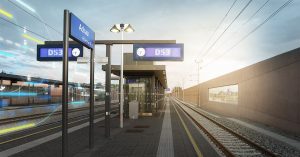 Siemens Mobility and ÖBB-Infrastruktur have put into operation the first hardware-independent cloud interlocking at the train station in Achau, Austria. The Distributed Smart Safe System (DS3) is a completely new digitalisation solution in the field of safety and security technology.
Siemens Mobility and ÖBB-Infrastruktur have put into operation the first hardware-independent cloud interlocking at the train station in Achau, Austria. The Distributed Smart Safe System (DS3) is a completely new digitalisation solution in the field of safety and security technology.
DS3 is the world’s first platform to securely make signalling applications functional and operational on standardised hardware. The platform can be used on different, commercially available hardware for various applications and interfaces of rail safety technology. It can form the basis for the digital interlocking and for the radio block center (RBC) in the ETCS.
“We are digitizing ÖBB’s infrastructure. The digital interlocking is a component of our comprehensive digitalisation strategy. This and many other projects make it possible to increase the capacity of our infrastructure and at the same time improve safety and security, punctuality and cost efficiency,” said Johann Pluy, Member of the Management Board of ÖBB-Infrastruktur AG.
The cloud interlocking technology creates various new possibilities that were either entirely or nearly out of reach until now. For example, signals and points can be smartly controlled, enabling innovative diagnoses, predictions of malfunctions and also predictive maintenance. This will make rail traffic even more punctual and effective, thus enhancing the attractiveness of trains as a means of transport and increasing passenger satisfaction.
DS3 makes signalling hardware independent and cloud-enabled. When switching to this new technology, infrastructure operators therefore have the opportunity to completely integrate existing installations and systems. The platform fulfills the world’s highest safety standards for rail safety and security and features other advantages like cost efficiency and flexible maintenance. In addition, it contributes to sustainability, by providing savings in terms of space and energy, compared to existing systems. In the future, interlockings can be significantly reduced and combined into one data center.
The DS3 solution allows the ÖBB-Infrastruktur to benefit from a wide variety of economic advantages, such as predictive, affordable maintenance of installations, while increasing its availability. Increased cost efficiency is a particularly attractive asset. DS3 boasts lower lifecycle costs compared to other solutions that are available on the international market. Furthermore, this project presents the first-ever approval of a SIL4 interlocking on a COTS hardware and is therefore an international pilot and reference project.
December 2018 already marked the start of the first joint field trials between ÖBB and Siemens, which were conducted successfully. Following approval of the system, the interlocking was able to be effectively put into live operation at the train station in Achau on the 18th November 2020, while assuming full responsibility for security and safety.
Share on:



